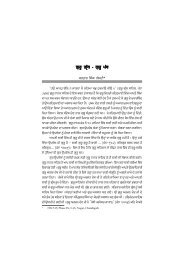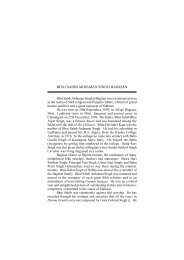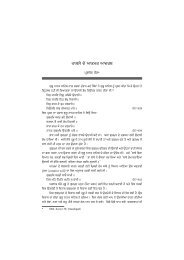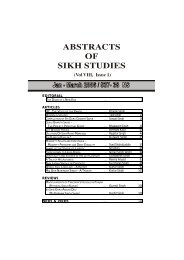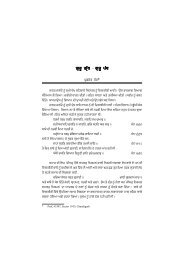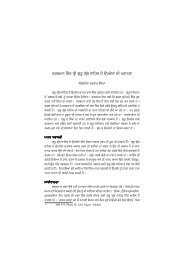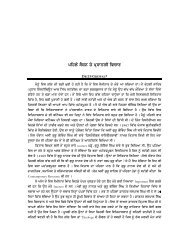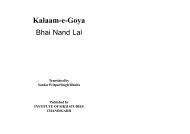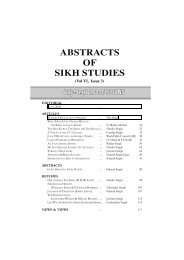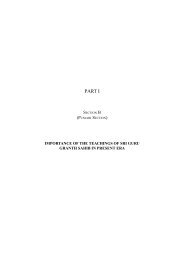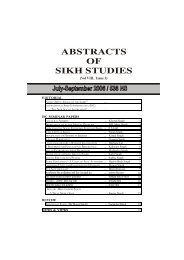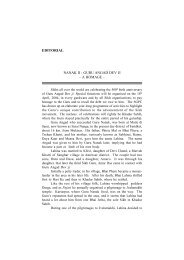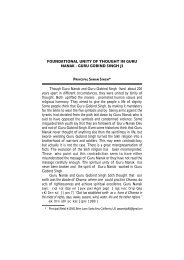editorial articles reviews news & views - Institute of Sikh Studies
editorial articles reviews news & views - Institute of Sikh Studies
editorial articles reviews news & views - Institute of Sikh Studies
You also want an ePaper? Increase the reach of your titles
YUMPU automatically turns print PDFs into web optimized ePapers that Google loves.
MCLEOD & FENECH AS SCHOLARS ON SIKHISM AND MARTYRDOM<br />
75<br />
II<br />
Fenech’s thesis Playing the Game <strong>of</strong> Love : The <strong>Sikh</strong> Tradition <strong>of</strong><br />
Martyrdom opens with a 500 word abstract <strong>of</strong> 3 paragraphs which seek<br />
to present the theme in “context <strong>of</strong> the past ten years” from operation<br />
“Blue Star” in June 1984 “and the subsequent anti-<strong>Sikh</strong> pogrom”. This<br />
was followed by a sustained campaign <strong>of</strong> <strong>Sikh</strong> genocide at the hands<br />
<strong>of</strong> “an intractable merciless foe” which reminded the people <strong>of</strong> the<br />
situation in the 18th century. Then Fenech makes the startling<br />
statement attributing it to ‘popular history’ (wherefrom he gets this<br />
stupid ‘popular history’ he does not disclose, neither do any<br />
contemporary sources disclose this so-called popular history) that<br />
people in 18th century saved themselves “by renouncing their faith<br />
and external insignia with which it is associated”, to say that<br />
contemporaries could adopt “a similar alternative to ensure one’s<br />
continued survival”.<br />
He qualifies it in the next paragraph by saying that, “This is,<br />
however, one alternative which the majority <strong>of</strong> eighteenth century<br />
<strong>Sikh</strong>s had never chosen.” He implies that some <strong>of</strong> them discarded<br />
“the external insignia”, and throughout his thesis, or the works <strong>of</strong><br />
McLeodian scholars, there is nothing from contemporary or near<br />
contemporary history to give that meaning or that sort <strong>of</strong> reporting.<br />
McLeod himself quotes the case <strong>of</strong> a boy, among Banda Singh<br />
Bahadur’s group <strong>of</strong> prisoners, who disowned his mother and kissed<br />
the scaffold. The Mughal persecution slowed down the process <strong>of</strong><br />
Khalsaisation <strong>of</strong> the <strong>Sikh</strong>s but no Khalsa in 18th century renounced<br />
his faith or external insignia. Let McLeod and his cronies interpret out<br />
clearly whether the <strong>Sikh</strong>s did or did not renounce their faith! There<br />
can be no midway in the two propositions.<br />
My first reaction in reading this was to use for the author a much<br />
stronger expression. But since it is generally advisable to keep the<br />
literary criticism in somewhat restrained language, I will prefer to term<br />
him a McLeodian puppy, shorn <strong>of</strong> his brain-power, the need to use his<br />
brain. I, however, would make it a s<strong>of</strong>t one. Even Kabir in Adi<br />
Granth says, “We are puppies in Thy mansion. We speak to Thee with



